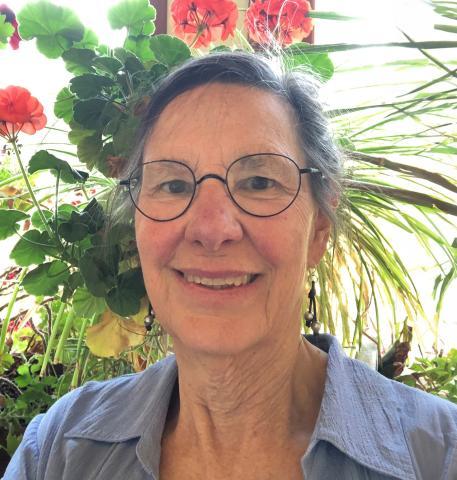An Artist’s Journey with Macular Degeneration: Wyncia’s Story
Learn tips for living with low vision.
By Wyncia Clute, as told to Julia Roth, BrightFocus Foundation



Learn tips for living with low vision.
By Wyncia Clute, as told to Julia Roth, BrightFocus Foundation

I was diagnosed with age-related macular degeneration (AMD) eight years ago at age 64. It’s in both of my eyes–one eye has stayed the dry form and the other has advanced halfway between dry and wet.
It’s the first age-related condition that I was diagnosed with, and it was a shock. It was unexpected and changed my perspective on aging.
Fortunately, my vision is still quite good. I’m lucky in that it was found early and has progressed slowly.
The first thing I did when I heard I might have macular degeneration was buy books online and sign up to learn to read Braille. I was completely terrified. The insight that I didn’t have was that macular degeneration can develop slowly, especially when caught early. That has been the case for me. Mine has developed slowly, and I’ve gotten treatment from the very beginning. I’m extremely thankful.
It’s so important to have some sort of personal connection to your doctor—especially an eye doctor, who you will see quite often if you are receiving shots for AMD. Sometimes it’s hard for the doctor to have enough time to get to know you. But it’s good to show a little bit more about yourself.

I am an artist, and shortly after I was diagnosed with AMD, I printed out a picture I painted to bring to my eye doctor. It was a picture of my granddaughter drinking a cup of hot cocoa (pictured, left). I wanted him to see what I do and how important my vision is to me.
I still paint, although my color distinction isn’t as good as it used to be. Over the last few years, my paintings got darker, possibly because I’m seeing less well and paint what I see.
Finding the BrightFocus AMD Community Circle and listening to the foundation’s monthly Macular Chats with experts, alongside doing my own research online, has helped me stay up to date on the latest treatments and innovations in research.
One thing I wish I had known was that progression of macular degeneration varies from patient to patient. Try not to leap into big-time fear right away—gather some information and take a deep breath. Then, you can begin to work with your individual situation. I’ve been very lucky that the progression of my macular degeneration has been slower.
Another thing I’ve been learning about is the relationship between high blood pressure, high blood sugar, and AMD progression. I recommend asking your eye doctor and primary care physician about that.
General awareness of the disease is important. When I tell people I have AMD, a lot of people don’t know what it is. Building awareness at an earlier age can’t hurt. You usually only find those things out if it runs in your family.
In terms of managing AMD, accept the fact that you need to find a doctor you will see regularly who will help you take care of your eyes. When you’re younger and don’t have a particular disease, it’s easy to check in infrequently with your doctor. Managing AMD really means establishing a relationship with a doctor and even changing doctors if you need to until you find the right fit.
Be gentle to yourself. You’ll be scared at first, but you get used to it. Try to take things one day at a time.
Embrace the assistive technology that’s available to help make things easier for those of us with low vision.
Don’t be afraid of getting shots in your eye. It’s no big deal. They numb your eye, and you don’t feel a thing. Many people don’t get treatment when first recommended because they’re afraid of the shots, and it’s not bad.
And my biggest tip? Find community. You’re not in this alone.
BrightFocus Foundation is a premier global nonprofit funder of research to defeat Alzheimer’s, macular degeneration, and glaucoma. Through its flagship research programs — Alzheimer’s Disease Research, Macular Degeneration Research, and National Glaucoma Research— the Foundation has awarded nearly $300 million in groundbreaking research funding over the past 51 years and shares the latest research findings, expert information, and resources to empower the millions impacted by these devastating diseases. Learn more at brightfocus.org.
Disclaimer: The information provided here is a public service of BrightFocus Foundation and is not intended to constitute medical advice. Please consult your physician for personalized medical, dietary, and/or exercise advice. Any medications or supplements should only be taken under medical supervision. BrightFocus Foundation does not endorse any medical products or therapies.
